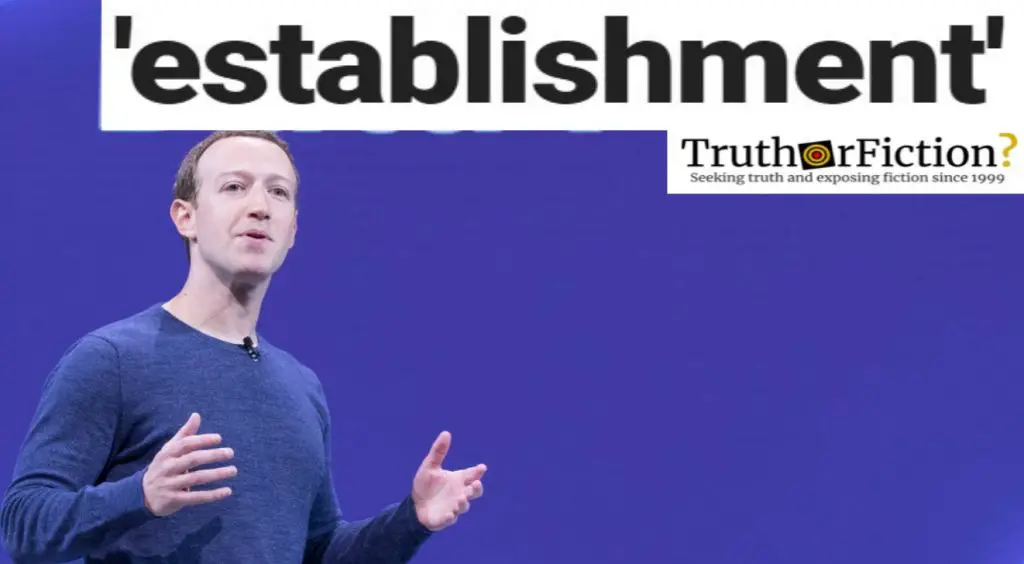Facebook owner Mark Zuckerberg claimed that a nebulous “establishment” mistakenly pushed for his platform to censor information regarding COVID-19 because they thought it was disinformation.
While discussing issues concerning moderation with with podcaster Lex Fridman, Zuckerberg — chief executive officer of Facebook’s parent company Meta — said during a June 8 2023 interview:
Fact Check
Claim: Zuckerberg Claims ‘Establishment’ Pushed for Censorship on COVID-19 Disinformation
Description: Facebook owner Mark Zuckerberg claimed in an interview that a nebulous ‘establishment’ mistakenly pushed for his platform to censor information regarding COVID-19 because they thought it was disinformation.
Misinformation, I think, has been a really tricky one because there are things that are obviously false, right, or they may be factual but may not be harmful; are you gonna censor someone for just being wrong, if there’s no kind of harm implication of what they’re doing? There’s a bunch of real kinds of issues and of challenges there … Take some of the stuff around COVID earlier in the pandemic where there were real health implications, but there hadn’t been time to fully vet a bunch of the scientific assumptions and unfortunately, I think a lot of the kind of establishment on that kind of waffled on a bunch of facts and asked for a bunch of things to be censored that, in retrospect, ended up being more debatable or true. That stuff is really tough, right? It really undermines trust in that.
Zuckerberg did not specify what he meant by “the establishment” or what claims ended up being “true,” but he said that the more salient issue concerning misinformation (or its intentional cousin, disinformation) was whether it would lead to physical harm toward someone.
“You want to reserve censorship of content to things that are of known categories of things that people generally agree are bad,” he said, adding that although Facebook users have an option where they would not see fact-checking alerts regarding content, posts that would incite violence would still not be allowed.
The idea that Facebook and other social media platforms “censored” right-wing claims at a disproportionate rate has been roundly debunked, including in a February 2021 study published by the Stern Center for Business and Human Rights at New York University.
“In fact, it is often conservatives who gain the most in terms of engagement and online attention, thanks to the platforms’ systems of algorithmic promotion of content,” said the center’s deputy director, Paul Barrett.
Zuckerberg’s interview aired not long after Facebook removed, then reinstated, the page for the Real Facebook Oversight Board advocacy group. That action took place after the group criticized Meta’s threat to withhold news content to both Canada and California in response to legislation that would force the company as well as other tech platforms to contribute to public funding initiatives benefitting news outlets.
Meta has yet to say why it took that action, or later reversed course. (Disclosure: Meta has previously — and falsely — claimed that Truth Or Fiction publishes “clickbait,” without explanation.)
Some accounts of the interview have claimed that Zuckerberg was referring to outlets participating in Facebook’s partnership with the International Fact-Checking Network (IFCN), but Zuckerberg did not make specific reference to that.
According to an April 2023 IFCN survey of 93 outlets taking part in that program, participants drew 45.2 percent of their funding from their involvement, compared to 29 percent from grants and 6.5 percent from donations and user subscriptions.
“Despite recent budget cuts and workforce reductions at leading technology companies, fact-checking organizations have not yet seen a decline in partnerships or grants from organizations like Meta and Google,” the IFCN reported.
“However, if this trend continues, the landscape may change, with budgets for combating misinformation potentially being reduced. Fact-checkers that heavily depend on revenue from partnerships with these industry giants might have to make significant adjustments.”
We contacted Meta to ask which COVID-19 related claims he could cite as examples of purported misinformation that turned out to be “debatable” or “true.” The company has not responded. The IFCN declined comment regarding Zuckerberg’s interview.
- The Case Against Mark Zuckerberg: Insiders say Facebook’s CEO Chose Growth over Safety
- Instagram Bans, Unbans Facebook Critic, and It Won't Say Why
- Claim of Anti-Conservative Bias by Social Media Firms is Baseless, Report Finds
- Fact-Checkers Boosted Budgets and Broadened Focus to Tackle Misinformation, Report Finds

